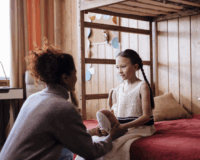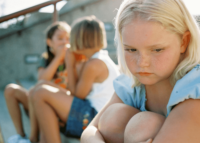Foster kids and our “own” kids

Our children were three, six, and eight when my husband and I felt a strong call to open our hearts to foster care.
But as we shared our plan to obtain our foster care license and move forward with what was undeniably God’s leading in our lives, we were asked one question again and again: “Don’t you worry about your own kids?”
Years after opening our home to our foster children—and eventually adopting some of them—I’ve pondered this question. Yes, there have been challenges with bringing foster children into our home, but there have also been beautiful opportunities for sanctification, obedience, and countless lessons all of us have benefited from.
Challenges
The work of foster care affects everyone in the home. The busyness of extra appointments, parent visits, frequent agency visits, court hearings, and simply additional child(ren) to care for all add up. From the outside, it can appear as if we are sacrificing time and energy we could invest in our own children as we pour into wounded foster children.
These dear ones come into our lives with higher needs.Their precious—and often fractured—souls need our love and attention. Many kids in foster care have been exposed to things that, at best, are not suitable for their age, and at worst, were sinful, harmful, and very confusing to them. This exposure to abuse and neglect often manifests in children through their anger or inappropriateness, and it can be tricky to navigate those difficulties when young children are present in the home. I was shocked when my (now son) was freshly three and asked me if the Band-Aid on my face (from a mole removal) was from something “Daddy did.” We learned to navigate both the heartbreak and demands of foster care alongside the needs of our biological children.
Obedience
Would God call us to something that is only bad? What about the blessings that come from obeying his call and opening our homes to children in need (Luke 11:28 ESV)? Through prayer and conviction, we ultimately determined the required sacrifices outweighed the difficulties and possible “harm” which concerned people.
Foster care is sanctifying—both for us and our biological children. It’s a taxing process but also rewarding when we look back and see what we have learned. In choosing to do this work, our biological children were given a front row seat to some of the most practical and fundamental principles exhibited in the Bible.
Woven throughout Scripture is a common theme of caring for the needy, fatherless, and less fortunate—generally looking out for the underdog. Jesus didn’t scoff at the sick, the contagious, and the destitute; rather, he showed great compassion to people on the fringes of society. He ate with sinners, healed the blind, and touched the lepers.
Jesus instructs his disciples, “Let the little children come to me and do not hinder them, for to such belongs the kingdom of heaven” (Matthew 19:14). Here we see his heart for children: while his disciples saw them as a distraction or a nuisance to the work they were doing, Jesus saw them as the work.
Repeatedly throughout the writings of several New Testament authors, we are directed to the importance of reaching out to those in need. James 1:27 says we are “to visit orphans and widows in their affliction.” John has a strong message for us in his first epistle, one that has become a cornerstone principle in our family: “If anyone has the world’s goods, and sees his brother in need, yet closes his heart against him, how does God’s love abide in him?” (1 John 3:17).
Lessons
Is foster care hard? Busy? Is it a lot to juggle when there are also biological children in the home? My answer is a hearty “yes” to all these questions! But tucked away inside these challenges are gifts and lessons waiting for us.
We saw our children give things up for the sake of the foster children who joined our family. We watched them as they opened their hearts, their bedrooms, and their toy boxes to give what was needed to those who were wounded and hurt. We all practiced patience while we waited for answers, wondering if these children would stay in our home or have to move on. And we learned to show grace when a child broke something dear to us out of anger or impulse.
We watched our children grow in empathy, become less selfish, and show a little more of Christ’s heart as we walked through various foster care placements. We saw them accept strangers as brothers and sisters in seconds, unbothered that other little people were claiming us as Dad and Mom. We watched them grieve the loss of those brothers and sisters as they left to go back to their biological families. The experiences were difficult, for them and for us, but we trusted the Lord would use it for their good. Certainly, they grew up with a deeper understanding of “true religion.”
Foster care is worthy work, one we do not regret exposing our kids to. Through the challenges, we have learned obedience, and we have been sanctified more into the likeness of Christ. We surfaced from the experience and marveled that we were the ones who were blessed. We have experienced lessons that were hidden treasures amid the difficulties—and we firmly believe they have been used for good in our children’s lives.
Consider a few extra resources:







